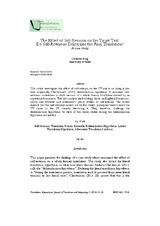Mostrar el registro sencillo del ítem
The effect of self-revision on the target text: do self-revisions deliteralise the final translation? A case study
| dc.contributor.author | Borg, Claudine | |
| dc.date.accessioned | 2019-04-12T07:30:17Z | |
| dc.date.available | 2019-04-12T07:30:17Z | |
| dc.date.issued | 2018 | |
| dc.identifier.issn | 2605-2954 | |
| dc.identifier.uri | http://hdl.handle.net/10396/18398 | |
| dc.description.abstract | This article investigates the effect of self-revision on the TT and in so doing it also tests empirically Chesterman’s (2011) deliteralisation hypothesis. It examines selfrevisions undertaken in draft versions of a whole literary translation created by an experienced translator. The data analysis methodology draws on Englund Dimitrova’s (2005) and Pavlović and Antunović’s (2013) studies of self-revision. The results indicate that the self-revisions carried out by this study’s participant tend to move the TT closer to the ST, thereby literalising it. They, therefore, challenge the deliteralisation hypothesis. In view of this, more studies testing the deliteralisation hypothesis are needed. | es_ES |
| dc.format.mimetype | application/pdf | es_ES |
| dc.language.iso | eng | es_ES |
| dc.publisher | UCOPress | es_ES |
| dc.rights | https://creativecommons.org/licenses/by/3.0/ | es_ES |
| dc.source | Transletters. International Journal of Translation and Interpreting 1, 15-36 (2018) | es_ES |
| dc.subject | Self-sevision | es_ES |
| dc.subject | Translation process research | es_ES |
| dc.subject | Deliteralisation hypothesis | es_ES |
| dc.subject | Literal translation hypothesis | es_ES |
| dc.subject | Alternative translation solutions | es_ES |
| dc.title | The effect of self-revision on the target text: do self-revisions deliteralise the final translation? A case study | es_ES |
| dc.type | info:eu-repo/semantics/article | es_ES |
| dc.relation.publisherversion | https://www.uco.es/ucopress/ojs/index.php/tl/index | es_ES |
| dc.rights.accessRights | info:eu-repo/semantics/openAccess | es_ES |

